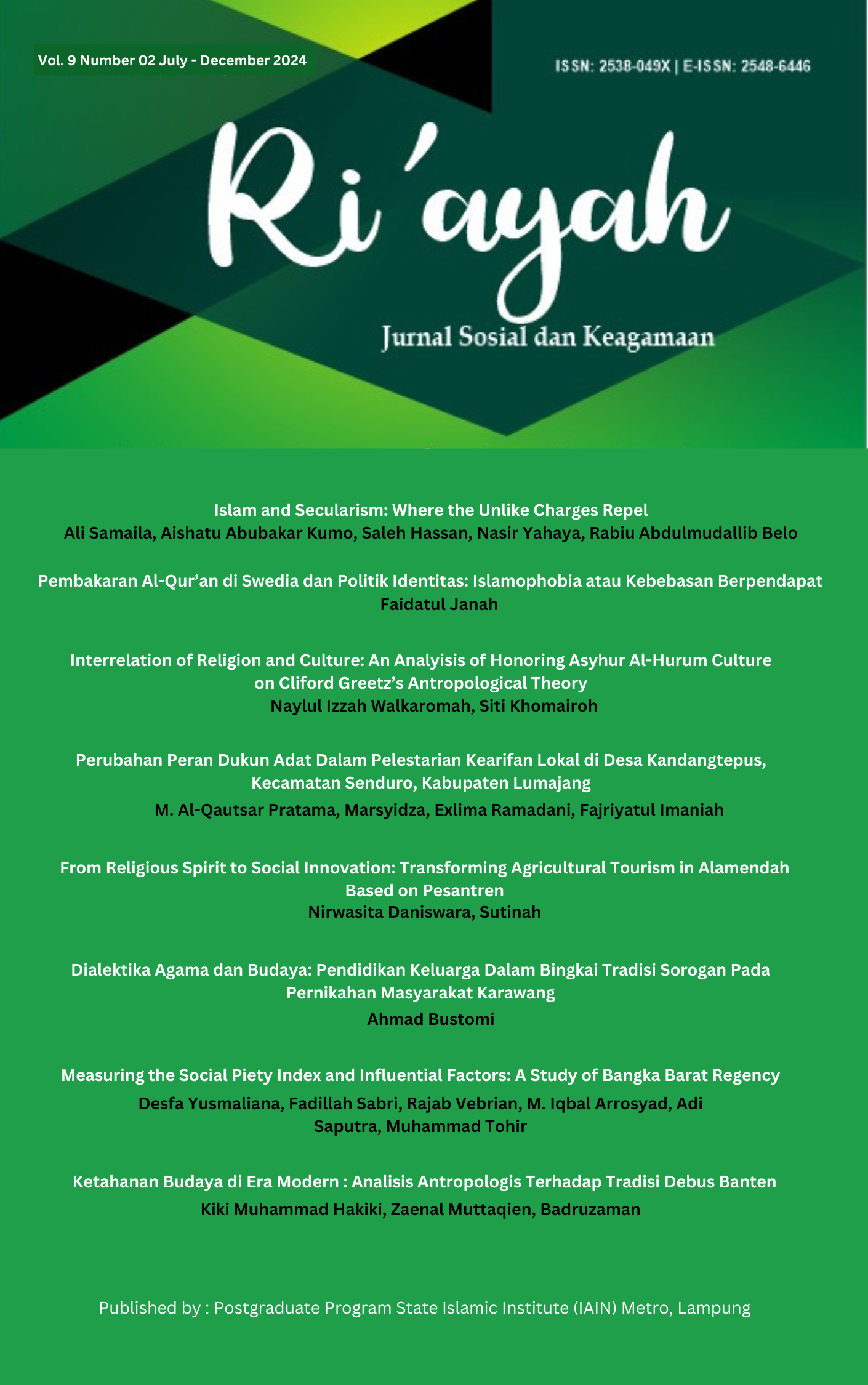Islam and Secularism: Where the Unlike Charges Repel
DOI:
https://doi.org/10.32332/4ttq1728Keywords:
Islam, Secularism, Religious freedom, WorldviewsAbstract
Since the advent of secularism in the middle-ages there exist a strong debate among Muslim scholars and thinkers on its compatibility with Islam. The proponents of secularism popularly known as secular Muslims upheld that Islam and secularism are two sides of the same coin because of their shared aspects while its opponents (the Islamists) uphold otherwise. This paper depends on convergence theory to argue that there are some similarities as well as differences between the two concepts. The study suitably adopted descriptive and comparative approaches of qualitative research to generate and analyses data. The study found that there are two types of secularism namely: the radical and moderate secularism. The radical secularism which is usually translated as “extremist” is characterized by hostile approaches to religion while the moderate secularism known as soft secularism acknowledges religious freedom, tolerance and pluralism which are all inherent in the Islamic world views. The major differences between the Islamic world views and that of the moderate secular views lie in the fact that Islam calls for humanity to embrace its faith (Da’awa) in spite its strong position on religious freedom and the Islamic concept of moderation (Wasatiyyah) which advocates upholding balance stance between two opposing extremes. On a final note the research recommends that Muslims should strongly uphold the Islamic teachings in their individual and societal lives alike.
Downloads
References
Al-Attas M.N. Secularization and the Crisis of Identity: The Muslim Encounter with Modern, Western Civilization Kuala Lampur, 2023
Al Faruki J. and Roknuzzaman Md. Secularism and the Muslim World: An Overview in Journal of Social Sciences, Rajshahi College vol.1 (1) 2017
Alam Mansoor, Islam and Secularism in Pakistan Horizon Vol. 66, No. 3 pp. 37-49 Pakistan: Pakistan Institute of International Affairs, 2013
Al-Juwaranah I. M &Qadir Ali (2015) Al-Isyanul Madaniy: Dirasatan Qanuniyyatin mu’asaratin in Mujallatul urduniyyah vol.12 no 2 http://hdl.handle.net/123456789/1040
Al-Qurtubi S. Al-Jamiu Li ahkami al-Qur’an npp,np retrieved via arabicpdfs.com/Tafsirul Qurtubi, 2022
Banchoff, Thomas F., and Robert. Wuthnow, Religion and the Global Politics of Human
Rights. Oxford University Pres, 2011
Bruinessen M.V, Secularism, Islamism and Muslim intellectualism in Turkey and Indonesia: Some Comparative Observations in Mirza Tirta Kusuma (ed.), Ketika Makkah Menjadi Las Vegas: Agama, Politik dan Ideologi, Jakarta: Gramedia, 2014
Huntington, S. P. The Clash of Civilizations and the Remaking of World Order. New York: Simon & Schuster Rockefeller Center, 1996
Hoebink Michel, Thinking about Renewal in Islam: Towards a History of Islamic Ideas on Modernization and Secularization in Arabica pp. 29-62 published by Brill, 1999.
J. Valk et al, An Islamic Worldview from Turkey, Palgrave Series in Islamic Theology, Law and History, https: doi.org./I0.I007/978-3-319-6651_1
Larsson G. (nd) Yusuf al-Qaradawi and Tariq Ramadan on Secularisation: Differences and Similarities in Gabriele
Marranci (Eds) Muslim Societies and the Challenge of Secularization: An Interdisciplinary Approach Singapore, Springer
Mubarakpuri S. et al, Al-misbahul Munir fi Tahdhibi Tafsiri Ibn Katheer vol.8 Riyadh: Darussalam, 2003
Resul A, Secularity, Positivism, Positivist Secularism and Turkey Master thesis Submitted to the Department Political Science and Public Administration Bilkent University Ankara, 1995.
Shook, J. The Meaning of ‘Secular’ as a Scientific Concept. in Secularism and Nonreligion, 9: 1, pp. 1–11 (2020). https://doi.org/10.5334/snr.124
Shakir A (tahqiq) A. Hanbal, Musnadul Imami Ahmad vol.36 Al-Qahira: Darul Hadith, 1995
Saghaye-Biria, Hakimeh. (n.d) “ReOrient 4.1 Produced and Distributed by Pluto Journals Decolonizing The ‘Universal’ Human Rights Regime: Questioning American Exceptionalism and Orientalism.” www.plutojournals.com/reorient.
Ulkar M.The Essense and Significance of the Religion of Islam in the Upbringing and Preservation of the Best Moral Qualities of a Person in JournalNX a Multidisciplinary Peer Reviewed Journal (2020)
Usturali, Adil. A Conceptual Analysis of Secularism and its Legitimacy in the Constitutional Democratic state. (2015)







